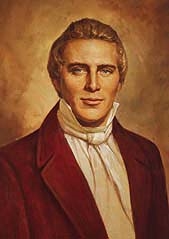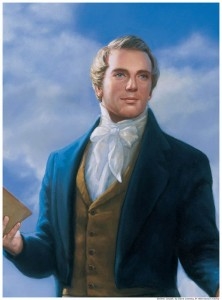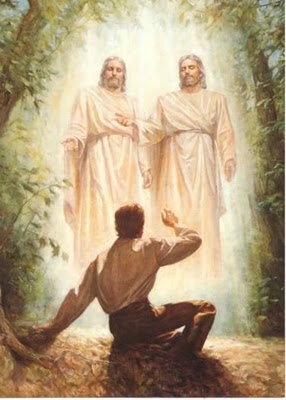 |
| Joseph Smith the Prophet (www.pbs.org/americanprophet/joseph-smith.html) |
"True heroism consists in being superior to the ills of life, in whatever shape they may challenge us to combat" (Napoleon Bonparte -Heroes Quotes). True modern day heroes, that describe Napoleon's perverse, aren't as superior to stand up and face the world, as older heroes once did. One of the only modern day heroes able to stand up, place his foot down, and even died for what he believed in was none other than Joseph Smith. Joseph Smith, Jr., was born in Sharon, Vermont, December 23rd 1805. He was the third son and the fourth child born to Joseph Smith Sr. and Lucy Mark Smith. To avoid debt, the Smith family traveled from Vermont to New York to obtain land for the large family's survival. Joseph Smith, like most farmers, didn't receive quality education. Only knowing little reading and writing, young Joseph Smith studied the bible in his free time to gain the necessary knowledge. When Joseph Smith was fourteen years old, he went to inquire with God to know which of all the religions were correct. Upon this meeting, he received a vision from God stating none of the churches were true and that he needed to resource the true church and translate The book of Mormon. Joseph Smith shows the world his heroism by having moral courage, leadership, and the will to sacrifice in the name of God.
Like the world's greatest heroes, Joseph Smith needed to have moral courage. Without this courage Joseph Smith would have fallen and sunk into despair, unable to accomplish the works of God and the goals he had set for himself. When Joseph was seven years old, he gained an infection in his shin bone (osteomyelitis) followed an epidemic of typhoid fever. This infection grew so bad, the doctors were afraid to they would have to amputate his leg. His mother, refusing to give up, begged the doctors to perform a surgery they had spoken of, involving removal of the infected bone. The doctors agreed to help. While undergoing this surgery the young boy refused to partake in wine to soothe pain, but rather endure with his father by his side. "I will not touch one particle of liquor, neither will I be tied down; but I will tell you what I will do--I will have my father sit on the bed and hold me in his arms, and then I will do whatever is necessary in order to have the bone taken out. Mother, I want you to leave the room, for I know you cannot bear to see me suffer so; father can stand it, but you have carried me so much, and watched over me so long, you are almost worn out. Now, mother, promise me that you will not stay, will you? The Lord will help me, and I shall get through with it." (PROPHET JOSEPH SMITH." About God and Jesus) Even for a boy as young as he was, Joseph Smith understood the concept of moral courage as he went through excruciating pains both physically and emotionally. Operations in the 1800's were almost always ineffective and painful. For a young boy to endure this pain, he needed the courage and faith that the doctors would be able to save his leg, which they were able to do. He, also, had the strength to force his mother away from his presence as he tried to protect her from seeing her son in traumatizing pain. More than once he forced her to leave him even when she heard him scream in agony "Oh, mother, go back, go back; I do not want you to come in--I will try to tough it out, if you will go away." (PROPHET JOSEPH SMITH." About God and Jesus) With no anesthesia to dull his sensation of pain, the boy dealt with more than just a surgery, but rather had to deal with the emotional pain he was causing upon his family.
Another example of Joseph Smith's moral courage was in 1832. After a year of living in Kirtland, Ohio, he was attacked by a group of men attempting to humiliate Joseph Smith. Successfully covering the man in tar and feathers, and also being responsible for the death of one of his and Emma Smith's twins, he spent the rest of the night removing and ripping the feathers and tar off of him. However, this is perhaps one of the most important events which shows Joseph Smith's Courage tested by a ferocious, unmerciful attack. Joseph Smith could have easily given up or have become a seeker for revenge, but instead his heart was full of remorse as he tried to continue the day as if nothing had happened. "My friends spent the night in scraping and removing the tar, and washing and cleansing my body; so that by morning I was ready to be clothed again. This being the Sabbath morning, the people assembled for meeting at the usual hour of worship, and among them came also the mobbers. . . With my flesh all scarified and defaced, I preached to the congregation as usual" (Joseph Smith and Sidney Rigdon Are Tarred and Feathered | Mormon History) Joseph Smith's courage is shown not only by returning to church the next morning, but by showing the men his mercy. He didn't rave on and openly admit what these men had done and he wasn't going to humiliate these men in front of the entire meeting, knowing if he talked about the subject, he would only cause more chaos and he would be threatening the safety of others at the meeting. Silence is a courageous act to commit even when a man has been scorned and beaten by his neighbor. Joseph Smith shows that actions speak without having to say a word to the offended. Joseph Smith had the courage to stand for what he believed to be right, from the ability to endure the pains of a surgery to ripping out tar and feathers from his bare skin.
 |
| Joseph Smith with The Book of Mormon (prophetjosephsmith.org/joseph_smith_timeline) |
Moral Courage is only one of the necessary traits a hero needs to spread his wisdom to the world. Joseph Smith was not only blessed with moral courage, but he gained leadership. This is another important trait for a hero to possess. Without this important principle, moral courage is useless; the hero would become unaware of the direction he must go unless he had leadership. After the translation of The Book of Mormon in 1830, Joseph Smith began to organize The Church of Jesus Christ of Latter Day Saints. He began the church by simply spreading its word, telling the world what he had seen. Eventually, he was able organize a group of well, pure, clean men into quorums. These men were highly ranked in the organization of the church and with the help of Joseph Smith they were able to baptize many. Joseph Smith made many settlements for the church from Fayette, New York to Kirtland, Ohio, Mentor, Ohio, and Independence, Missouri and the Mormons began to prosper in their new land. Non-Mormons and other scoundrels became enraged with the success of Joseph Smith and his followers obtained. These men were also fearful of his successes, and of the doctrine they didn't understand, and of his natural leading skills. The answer was simple for them: kill Joseph Smith. To rid the world of Joseph Smith and his success, many non-members chased his followers and persecuted them. His leadership was shown by his determination to protect the members of the church, but to perform this act he had to go as far as moving the church from location to location. When Joseph Smith was caught by the crooks and persecutors, they threw him in to jail countless time with no real evidence of committing any crime. He even went as far as sacrificing himself to jail to protect the members of the church. Like any true leader, he gave up his freedom for the safety his brothers and sisters from the church. "Joseph Smith's leadership extended beyond his religious responsibilities. In Nauvoo, the Prophet was involved in civil, legal, business, educational, and military service. He wanted the city of Nauvoo to offer all the advantages and opportunities of cultural and civic progress to its citizens." ("Teachings of Presidents of the Church: Joseph Smith The Life and Ministry of Joseph Smith.") Without Joseph Smith's determination, the people of Nauvoo would have sunken and fallen apart without their leader's will power to work and protect the church from the unholy and evil.
He was also a leader when expressing the doctrine of The Book of Mormon, sharing his new knowledge with the rest of the world guiding the members into everlasting peace. Joseph Smith and the rest of the members of the church were unknowingly leading future pioneers to find new land to take, from the far west where Mormons were continually being exiled from one state after another. Joseph Smith shows his leadership by having accomplished successfully organizing the church on his own, surviving being throw into jail and creating an unknown path when the members were continually being kicked out from state to state as they created a civilization in Utah after his death.
Without Joseph Smith's leadership the entire church and his courage would have fallen apart. However, a hero must posses one more trait if he ever hopes to become successful. The will to sacrifice in the name of God. A hero cannot expect to know his leadership and courage without seeking the word of God. Joseph Smith had asked God when he was fourteen years old and with his newfound abilities, he was able to withstand any miserable event that would accrue in his life. After receiving the messages from God, Joseph Smith became the prophet and the restorer of the church. With his courage and leadership, the prophet of God set out to the world to spread his knowledge. Not everyone in the world was so willing and because of this they swore to kill Joseph Smith. Angry mobs, protesters and even members who fell away from the church persecuted Joseph Smith wherever the Prophet tried to make a rendezvous point. Joseph Smith had to make ultimate sacrifices to fulfill the works of God. Many of these sacrifices included, losing his freedom, called a scoundrel and developing a false reputation, the death of six of his children out of the eleven which he had, the mobs and attacks the family had to endure, the unapproved Emma Smith family when he could have easily given up his religion to win their trust, and the most important thing Joseph Smith sacrificed was his life.
Joseph Smith didn't have to give up the most important things in his life to anyone. No one ever forced Joseph Smith to do anything, but rather it was his own actions and determination which lead him to be the man he once was. He lost his children, he and his wife had to suffer the consequences of everything they lost and the people who died believing what he had taught. Joseph Smith, literally, had everything taken away from him because of what he stood for. Sacrifice is a method a hero must take to understand the importance of what he already has so that he might be able to strengthen the people around him.
Joseph Smith and his Brother Hyrum Smith surrendered to the Missouri enforcements, both knowing they could be killed, they gave up their lives knowing that their friends and family would be safe. The two men took this chance to protect the family of the church, knowing unnecessary bloodshed and many innocent lives would have been taken if it weren't for the will to protect the people. On June 27, 1844 Joseph Smith and his brother were murdered in the Carthage Jail, Illinois. "At the age of 38, the Prophet Joseph Smith had sealed his testimony with his blood. His work in mortality completed, the Church and kingdom of God set in place for the last time on earth, Joseph Smith fell to the bullets of assassins." ("Teachings of Presidents of the Church: Joseph Smith The Life and Ministry of Joseph Smith.") Joseph Smith knew and expected what would happen when he began to spread the teachings around the world. No matter what happened to him, he stood his ground and declared to the world what he had seen and the teaching he would give. He understood and believed in his heart that what he had done was correct. It pushed himself and his family to the limits, death after death and jail after jail and then, to the greatest sacrifice he made, Joseph Smith died a horrible death as a martyr and left this world to return to the presence of God remembered as a hero to the church.
 |
| Joseph Smith-The First Vision (agoodcadence.blogspot.com/2011/03/new-movie-about-joseph-smith.html) |
The traits of a hero determine the strength of a people's heart. A hero's heart is shown to the world by his actions and how he impacts it. However, to have this determination and pure, righteous heart, a hero must have moral courage, leadership, and the will to sacrifice in the name of God. A hero who has these traits can live up to their potential; Joseph Smith is example of these heroes. He had the strength and faith to continue his works even after everything that happened to him. He had the courage to stand up for what he believed to be true, the leadership to start and organize a church, and the will to sacrifice his own life for God. Joseph Smith was truly a hero in the eyes of men, who seek God's light. He devoted his life to God, sacrificing everything he owned, leading the people to a new land, and surviving numerous attacks and personal events. He endured more hardships that strengthened this heart and mind which characterizes his qualities a hero must obtain during his lifetime. Of course, the characteristics of a hero vary from the actions a hero makes to deal with his tribulations. With these actions, a hero has the power to change his own destiny depending on his procedures and how he goes and continues his work. The world rarely ever finds a hero who has moral courage, leadership, and the will to sacrifice. Joseph Smith was one of the only modern day people who had and used these traits for good, winning him the title of hero.
Work Consulted
"American Prophet: The Story of Joseph Smith." PBS: Public Broadcasting Service. Web. 22 May 2011. http://www.pbs.org/americanprophet/joseph-smith.html.
Detroit: Macmillan Reference USA, 2005. 8446-8448. Gale Virtual Reference Library. Web. 12 May 2011.
Hansen, Klaus J. "Smith, Joseph." Encyclopedia of Religion. Ed. Lindsay Jones. 2nd ed. Vol. 12.
Heroes Quotes - Quotations and Famous Quotes on Heroes." Famous Quotes, Quotations and Proverbs in Proverbia.net. Web. 18 May 2011.
"Joseph Smith 1805-1844." American Eras. Detroit: Gale, 1997. Gale Student Resources In Context. Web. 4 May. 2011.
Joseph Smith and Sidney Rigdon Are Tarred and Feathered | Mormon History." Mormon History - History of Mormonism. Web. 17 May 2011. http://historyofmormonism.com/mormon-history/two-church-centers/tcc-1832/joseph-and-sidney-tarred/.
LDS.org - Liahona Article." The Church of Jesus Christ of Latter-day Saints. Web. 17 May 2011. http://lds.org/ldsorg/v/index.jsp?vgnextoid=f318118dd536c010VgnVCM1000004d82620aRCRD
"New Movie About Joseph Smith." A Good Cadence. Web. 22 May 2011. http://agoodcadence.blogspot.com/2011/03/new-movie-about-joseph-smith.html.
"PROPHET JOSEPH SMITH." About God and Jesus. Web. 16 May 2011.http://truespiritofchrist.com/prophet-joseph-smith/.
Smith, Joseph." World Book Student. World Book, 2011. Web. 12 May 2011.
"Teachings of Presidents of the Church: Joseph Smith The Life and Ministry of Joseph Smith." The Church of Jesus Christ of Latter-day Saints. Web. 16 May 2011 http://lds.org/manual/teachings-of-presidents-of-the-church-joseph-smith/the-life-and-ministry-of-joseph-smith?lang=eng.
"Timeline." Joseph Smith, Prophet. Web. 22 May 2011.
http://prophetjosephsmith.org/joseph_smith_timeline.
Utah History Encyclopedia." Media Solutions - Information Technology - The University of Utah. Web. 18 May 2011. http://www.media.utah.edu/UHE/s/SMITH,JOSEPHJR.html.
Page created on 5/23/2011 12:00:00 AM
Last edited 5/23/2011 12:00:00 AM
